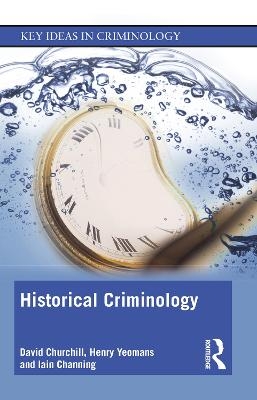
Historical Criminology
Seiten
2021
Routledge (Verlag)
978-0-367-18575-6 (ISBN)
Routledge (Verlag)
978-0-367-18575-6 (ISBN)
This book sets an agenda for the development of historical approaches to criminology. It defines ‘historical criminology’, explores its characteristic strengths and limitations, and considers its potential to enhance, revise and fundamentally challenge dominant modes of thinking about crime and social responses to crime.
It considers the following questions:
What is historical criminology? What does thinking historically about crime and justice entail?
How is historical criminology currently practised? What are the advantages and disadvantages of different approaches to historical criminology?
How can historical criminology reshape understandings of crime and social responses to crime?
How does thinking historically bear upon major theoretical, conceptual and methodological questions in criminological research?
What does thinking historically have to offer criminological scholarship more broadly, and the uses of criminology in the public realm?
In this book, Churchill, Yeomans and Channing situate ‘historical thinking’ at the heart of historical criminology, reveal the value of historical research to criminology and argue that criminologists across the field have much to gain from engaging in historical thinking in a more regular and sustained way.
This book is essential reading for all criminologists, as well as students taking courses on theories, concepts and methods in criminology.
It considers the following questions:
What is historical criminology? What does thinking historically about crime and justice entail?
How is historical criminology currently practised? What are the advantages and disadvantages of different approaches to historical criminology?
How can historical criminology reshape understandings of crime and social responses to crime?
How does thinking historically bear upon major theoretical, conceptual and methodological questions in criminological research?
What does thinking historically have to offer criminological scholarship more broadly, and the uses of criminology in the public realm?
In this book, Churchill, Yeomans and Channing situate ‘historical thinking’ at the heart of historical criminology, reveal the value of historical research to criminology and argue that criminologists across the field have much to gain from engaging in historical thinking in a more regular and sustained way.
This book is essential reading for all criminologists, as well as students taking courses on theories, concepts and methods in criminology.
David Churchill is Associate Professor in Criminal Justice at the University of Leeds, UK. Henry Yeomans is Associate Professor in Criminology and Criminal Justice at the University of Leeds, UK. Iain Channing is Lecturer in Criminology and Criminal Justice at the University of Plymouth, UK.
Introduction 1.Historical thinking 2.Time and method 3.Theory and concepts 4.Pasts and futures Conclusion: Ten points of historical criminology
| Erscheinungsdatum | 01.12.2021 |
|---|---|
| Reihe/Serie | Key Ideas in Criminology |
| Verlagsort | London |
| Sprache | englisch |
| Maße | 129 x 198 mm |
| Gewicht | 200 g |
| Themenwelt | Geschichte ► Teilgebiete der Geschichte ► Kulturgeschichte |
| Geschichte ► Teilgebiete der Geschichte ► Militärgeschichte | |
| Recht / Steuern ► EU / Internationales Recht | |
| Recht / Steuern ► Rechtsgeschichte | |
| Recht / Steuern ► Strafrecht ► Kriminologie | |
| Recht / Steuern ► Strafrecht ► Strafverfahrensrecht | |
| Sozialwissenschaften | |
| ISBN-10 | 0-367-18575-X / 036718575X |
| ISBN-13 | 978-0-367-18575-6 / 9780367185756 |
| Zustand | Neuware |
| Haben Sie eine Frage zum Produkt? |
Mehr entdecken
aus dem Bereich
aus dem Bereich
der stille Abschied vom bäuerlichen Leben in Deutschland
Buch | Hardcover (2023)
C.H.Beck (Verlag)
23,00 €
vom Mittelalter bis zur Gegenwart
Buch | Softcover (2024)
C.H.Beck (Verlag)
12,00 €
Die Revolution des Gemeinen Mannes
Buch | Softcover (2024)
C.H.Beck (Verlag)
12,00 €


